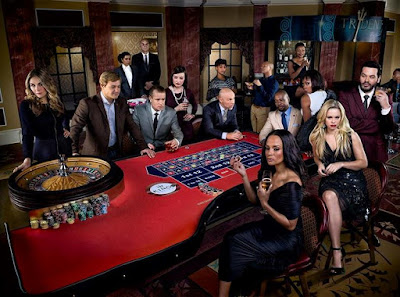The shocking labour court case between the SABC and its former head of TV Verona Duwarkah who was fired and replaced in July this year after a massive falling out with the controversial SABC boss Hlaudi Motsoeneng, not only lifts the lid on how he traumatised her, but also how SABC TV viewership is plunging and how Hlaudi Motsoeneng usurped and is allegedly flouting content commissioning policy.
Meanwhile TV channels like SABC2 and SABC3 are floundering under the devastating new content commissioning regime Hlaudi Motsoeneng implemented earlier this year after sidelining Verona Duwarkah and which also led to her leaving the SABC.
The City Press and Sunday Times newspapers on Sunday both reveals details from Verona Duwarkah's shocking labour court case with the South African public broadcaster.
Verona Duwarkah was kicked out the door by the SABC after fighting and being traumatised by Hlaudi Motsoeneng as chief operating officer (COO) - who is now the head of SABC's corporate affairs but remains in his same opulent 27th floor office.
Hlaudi Motsoeneng who in 2016 several times mentioned that the SABC has set aside a budget of R600 million to produce new TV content, has set up a "Special Projects" unit to essentially "take over" commissioning of new programming.
This new process especially favours new and inexperienced producers including TV stars with bad TV ideas now wanting to make television. Verona Duwarka fought against this, warning that Hlaudi Motsoeneng is flouting due diligence and processes and policy.
This Special Projects team at the SABC, according to City Press, is led by Jacqui Hlongwane, the SABC's SABC2 programming executive, and Danie Swart, the head of the SABC Education division.
Hlaudi Motsoeneng and the roped in SABC executives allegedly flouted not just the SABC's own commissioning policies but also that of South Africa's broadcasting regulator, the Independent Communications Authority of South Africa (Icasa).
In the shocking court case that she won in September, Verona Duwarkah - who had been at the SABC for 25 years before she was forced out - details her "severe stress" caused by constantly fighting with Hlaudi Motsoeneng behind the scenes.
After winning her court case against the SABC and Hlaudi Motsoeneng, Verona Duwarkah returned to the SABC in September, but after less than a week back at work got a termination of employment payout in the form of a golden handshade and left.
In the court papers, Verona Duwarkah revealed the fighting with the controversial SABC boss Hlaudi Motsoeneng caused her to be "emotionally, physically and mentally devastated".
The SABC, through Mohlolo Lephaka as the SABC's head of human resources, in a responding affadavit, accused Verona Duwarkah of making "malicious" claims" and of taking too much sick leave and even wondering on court papers of "whether depression prevents one from working".
The SABC accused her of non-performance by not commissioning new TV shows quickly enough.
The SABC further slammed Verona Duwarkah in the court papers, saying her claims are "irrelevant, untrue, unfounded and unsubstantiated personal attacks" on Hlaudi Motsoeneng.
Verona Duwarkah said "The final straw came when instructions were given to me by Hlaudi Motsoeneng that I had to execute and implement material changes in policy, despite the fact that these were not approved in accordance with the operating standards."
Verona Duwarkah reveals in the court papers how the SABC's Hlaudi Motsoeneng utterly humiliated her in front of other TV executives and how she repeatedly warned him to stop meddling in everything since it's causing dramatic revenue losses for the SABC as well as audience erosion.
The Sunday Times details Verona Duwarkah's revelations of how the famously matricless Hlaudi Motsoeneng wasted millions of rands at the SABC.
Hlaudi Motsoeneng ordered the broadcasting of sport events that doesn't have viewers, ordered her to dish out TV contracts of millions of rands to people whose bad ideas had been rejected, and ordered presenter line-up changes at awards shows broadcast by the SABC like The Metro FM Awards in January and The South African Music Awards in June at "vast additional costs".
"Hlaudi Motsoeneng hand-picked a select few producers and instructed me to ensure they were given contracts, even though some of their proposals had previously been rejected by the content team," says Verona Duwarkah in the labour court case papers.
Verona Duwarkah in court papers said Hlaudi Motsoeneng "started acting more erratic as time went on".
Despite the SABC's falling revenue and sagging viewership, Hlaudi Motsoeneng has been adamant to splurge on new content to boost local programming to 90% for the SABC's TV stations, starting with SABC3 at 80% where all of the newly rushed-to-air shows have been total rating flops and dragged SABC3 revenue and ratings down even further.
Meanwhile, out of the Request for Proposals (the so-called RFP book) that the SABC used to issue to producers detailing what content the SABC wants made for broadcast and which Hlaudi Motsoeneng did away with, it's revealed that the SABC only commissioned a paltry 57 of 1 426 proposals the public broadcaster got from the South African TV industry.
Meanwhile the SABC apparently has no current commissioning policy on its website for producers.
The SABC's acting chief operating officer (COO) Bessie Tugwana who've been shuffled into several positions this year, told City Press in another report about SABC2 and SABC3's shocking ongoing viewership losses that the channels had been sliding for years.















